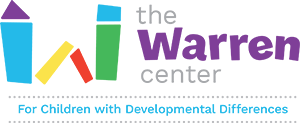
What Are Communication Developmental Delays?

- Speech is the verbal expression of language through vocalization and articulation. It includes the ability to produce sounds and words in an understandable way.
- Language refers to the entire system of human communication. It includes the ability to produce and understand verbal, non-verbal, and written communication.
While speech and language are two distinct categories, speech and language delays often overlap. For example:
- A speech-language pathologist might diagnose a child with a speech delay if the child’s words and phrases are impossible to understand
- A speech-language pathologist might diagnose a child with a language delay if the child can pronounce words but has trouble putting words together into sentences.
What are the Stages of Speech and Language Development?
The stages of speech and language development are straightforward for all children; however, the age at which each child reaches the necessary stage can vary widely.
Talk to your physician during a wellness checkup if your child has not developed the milestone stage at the expected age. The physician may then refer your child to a speech-language pathologist.
- Before 12 Months – Infants typically make sounds in response to their surrounding environment. Babbling and cooing are the preliminary stages of speech development. Imitation of words is the preliminary stage of language development. For example, by nine months a child might imitate “mama” or “dada” (without necessarily knowing what those words mean). Babies might also start recognizing names of desired objects (such as bottle, binky, etc.). An infant that does not respond to sound or makes no babbling noise at all should be examined right away to rule out hearing loss.
- Between 12 and 15 Months – Children have a wider range of speech sounds and patterns (including consonants like b, d, m, or n) and begin to say nouns like “baby” or “ball.” They can also comprehend simple directions (such as “Give mommy the toy”).
- Between 18 and 24 Months – Many toddlers can say 20 words by 18 months and approximately 50 words by age two. They may begin to state two-word phrases (such as “baby crying”) and should be able to identify common objects when asked. By 24 months, children can typically follow two-step commands (such as “Please pick up the teddy bear and bring it to me”).
- Between 2 and 3 Years – At this age, active vocabulary increases, and a child can usually combine three or more words into a sentence. A child should be able to identify colors and other descriptive concepts (such as loud versus quiet, big versus small).
What are the Telltale Signs of a Speech or Language Delay?
Parents usually suspect speech or language delays when a child takes longer than the expected age to reach the standard communication stages. You should contact your doctor if you notice the following:
- By 12 months, the child does not use purposeful gestures (such as pointing or waving goodbye)
- By 18 months, the child does not verbalize, insists on always using gestures, or cannot imitate sounds
- By 24 months, the child cannot comprehend simple directions or verbal requests
- By 2 years, the child cannot produce simple words to express immediate needs
- By 2 years, the child’s voice always has an unusual sound (such as nasally or raspy)
- Between 3 and 4 years, the child’s words are not generally understood
What Causes Speech or Language Delays?
The cause of speech or language delays may be physiological or psychological. For example,
- Oral impairment (cleft palette, macroglossia, or short frenulum) can limit speech production.
- Oral-motor problems due to neurological issues in the brain the control speech (making oral-motor coordination difficult). These coordination problems can also cause feeding delays.
- Hearing problems can delay comprehension as well as articulation of speech. For this reason, an audiologist may examine your child (in addition to a speech-language pathologist). Hearing problems may be congenital, progressive, or the result of chronic infections or illnesses.
- Psychological or environmental causes are rare, but a doctor may refer the child to a psychiatrist to rule out any issues.
How Can a Speech Therapist or Language Specialist Help?
Foremost, doctors recommend an evaluation from a speech-language pathologist. This trained pathologist checks for milestones in communication development. The evaluation may include the following:
- What the child understands (known as receptive language)
- What the child can say (known as expressive language)
- How the child attempts to communicate (verbal versus gesturing)
- Vocalization and sound development
- Clarity of speech
- Oral-motor status (for speech and swallowing)
The speech-language pathologist may conclude that your child needs speech therapy. This trained therapist works one-on-one to improve your child’s communication skills and advises what you can do at home. Contact the Warren Center for more information on how to obtain speech therapy for your child.


